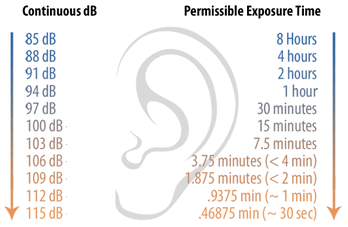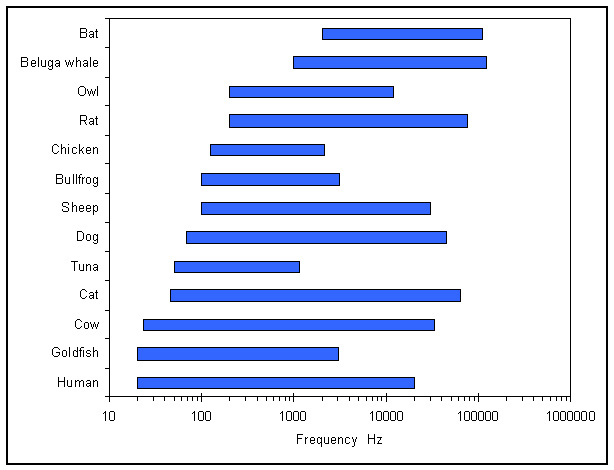Hearing Loss and Protection:
What Causes it and How We Can Protect Ourselves
Natural Hearing Loss
The loss of hearing can come from multiple causes, some of which we can't control, such as age. We learned in our previous section on the human ear that we're able to identify individual pitches because of the very fine hairs located within our cochlea. As we grow older, some of these hair cells actually die, and we lose the ability to hear particular frequencies. This usually starts with the extremes, so our ability to hear extremely high and low sounds. And so while this happens naturally to an extent, the "aging" process can be sped up drastically though if we don't take proper care of our hearing. For a demonstration on this, watch the following clip and test how "old" your ears are before reading further.
Preventable Hearing Loss

Many of you have probably already attended your first real concert, or perhaps have seen a local band put on a live performance. One thing that's common in all concerts, no matter who it is or what genre, is that they're loud, very loud. Even if you've never experienced this, think to a time where you heard a loud noise really close by. Do you remember how afterwards you could hear a high pitched ringing in your ears? This ringing is actually caused by those same tiny hairs in the cochlea which identify different sounds. When we hear them ringing like that, it's actually because those particular hairs are about to die because of the extreme loud noise that they've been exposed to.
Now don't worry just yet, just because a few hairs have died doesn't mean we are suddenly deaf. There are thousands of these hairs, and it just means we've lost the ability to hear that particular extremely high pitch. In essence, we're speeding up the aging process of our ears. So while it might not seem to us like our hearing has changed now, the difference will be much more apparent as we get older.
Now don't worry just yet, just because a few hairs have died doesn't mean we are suddenly deaf. There are thousands of these hairs, and it just means we've lost the ability to hear that particular extremely high pitch. In essence, we're speeding up the aging process of our ears. So while it might not seem to us like our hearing has changed now, the difference will be much more apparent as we get older.
So how loud does a noise have to be to actually cause damage?
When trying to determine if a sound will cause damage, we have to ask ourselves two questions: How loud is it and How long did it last? We learned that we measure sound in Decibels (dB), and so a simple way to think about it is that the louder the sound is, the quicker it will damage our hearing. For example, hearing damage starts with a sound that is 85 dB (think of the noise from traffic in Vancouver), but it would take 8 hours at that sound level for it to cause hearing damage. But as noises get louder, the time it takes for hearing damage to occur gets shorter and shorter.
To demonstrate this, lets look at typical rock concert which is 115 dB loud. At this level it now only takes 30 seconds to cause hearing damage! So while a difference ofonly 30 dB might not seem like much, it now only takes a fraction of the total time it did earlier for it to affect our hearing.
The chart below shows a more detailed look at the relationship between sound and time:
To demonstrate this, lets look at typical rock concert which is 115 dB loud. At this level it now only takes 30 seconds to cause hearing damage! So while a difference ofonly 30 dB might not seem like much, it now only takes a fraction of the total time it did earlier for it to affect our hearing.
The chart below shows a more detailed look at the relationship between sound and time:
How can we protect our hearing?
Now if you've read this far and are feeling very worried about hearing damage, try not worry! While just avoiding exposure loud noises is best, there are times where we can't help but be around them for whatever reason. So here are 3 easy ways that we can decrease our chances of hearing damage:
1. Walk Away:
This literally means move away from the source of the sound, the further you are from a source, the lower the dB level will be.
2. Turn it down:
If you have control of the volume source, as on a tv, iPod, stereo, simply turn it down a bit. Think about if you really need it to be that loud for you to enjoy it.
3. Use earplugs:
Just because you're worried about your hearing doesn't mean you can't go to that big concert, it just means we need to be smart. Even cheap earplugs or earmuffs can cut down the dB levels significantly while not preventing you from enjoying the music. Even in our Band classes, it's amazing how loud things can get, so perhaps think about using them even there!
Fun fact: The human range of hearing goes from 20-20 000 Hz, but different animals and species have different abilities. Check out this fun chart before to see how we compare to other types of animals!


